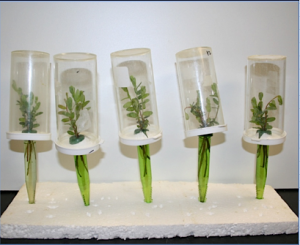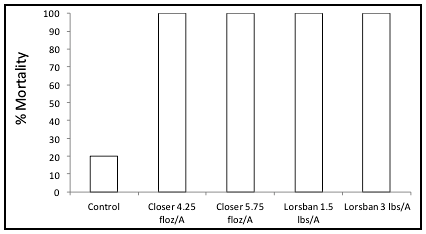Recently we conducted an experiment to test the efficacy of a newly-registered insecticide (Closer SC) in cranberries against blunt-nosed leafhopper nymphs.
Closer (Dow Agrosciences) is an insecticide for the control of sap-feeding insects, including leafhoppers, aphids, and whiteflies. It has both systemic and translaminar activity, belongs to a new class of insecticides (the sulfoximines), and has minimal impact on beneficial organisms.
Insecticide control for leafhoppers is best achieved pre-bloom when targeting the nymphal stage, i.e., immatures. Broad-spectrum insecticides (e.g. Lorsban) are currently recommended for their control. Thus, Closer may provide an alternative to broad-spectrum insecticides and likely be more compatible with biological control because it has less of an impact on natural enemies.
To test the efficacy of Closer against blunt-nosed leafhoppers, an experiment was conducted in an ‘Early Black’ bog located at the Rutgers P.E. Marucci Center.
Closer and Lorsban were applied at 2 rates (full and half label rates) to 60 × 60 cm plots. Control plots received no insecticide. Insecticide applications were made with R&D CO2 backpack sprayer, using a 1-liter plastic bottle. Four hours after treatment, 4–5 insecticide-treated uprights were inserted in florists’ water picks, enclosed in a ventilated 40-dram plastic vial, and secured on Styrofoam trays (see picture). Each treatment was replicated ten times (i.e., total of 10 vials per treatment). Five blunt-nosed leafhopper nymphs were placed inside each vial. Plants and insects were placed on a light bench in the laboratory at approx. 25°C, on a 15:9 L:D cycle. Number of leafhoppers (alive or dead) was recorded 24 hours after transfer.
Closer and Lorsban were highly effective against blunt-nosed leafhoppers-100% mortality at both rates (see figure).
Further studies will be conducted in 2014 in commercial bogs after receiving the state label.



